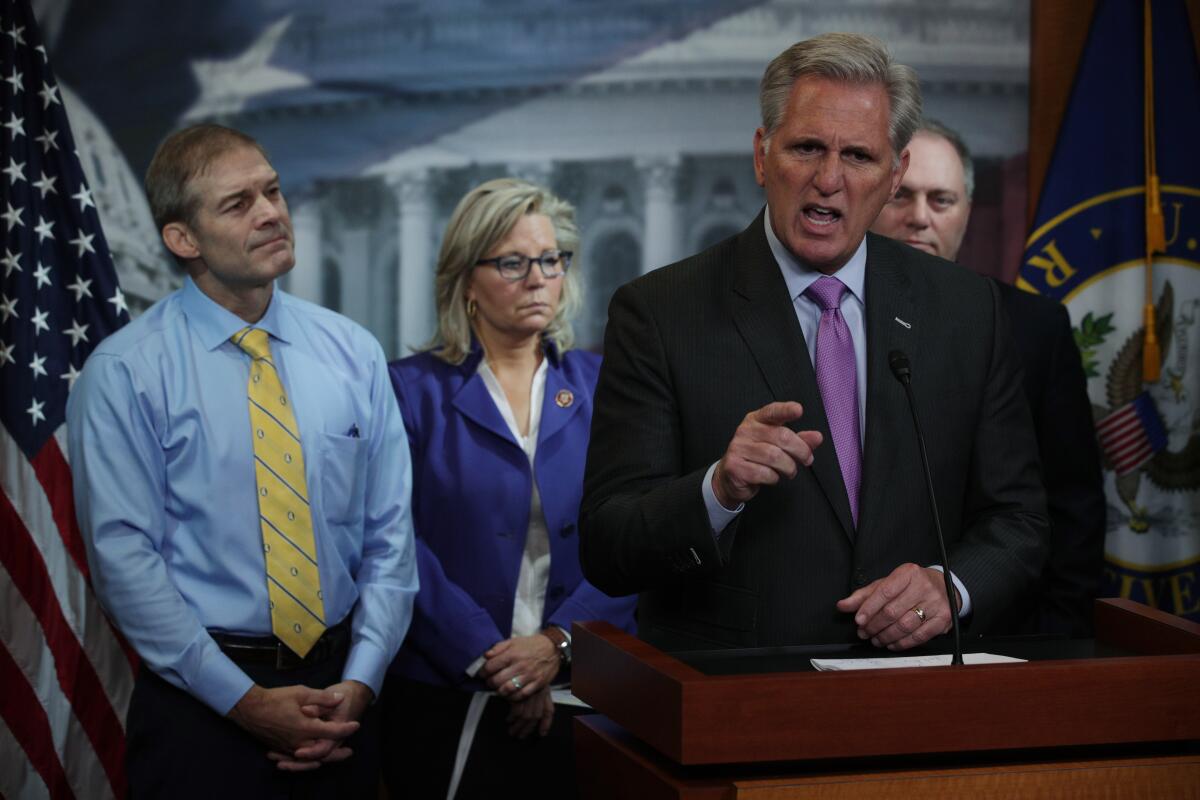Column: House Republicans should stop following Netanyahu’s chaotic example

- Share via
A grieving and besieged Israel offers a warning for Americans, if only we’d heed it.
Sound the alarm: When politicians stoke domestic divisions for political gain — identifying as enemies their fellow citizens, government institutions, judges, military critics and the media — those so-called leaders leave their nation distracted and weakened to the threats from real enemies beyond their borders. That’s what Israeli Prime Minister Benjamin Netanyahu has done all year along with his right-wing party and the most extremist Cabinet in the country’s history, losing sight of the real perils.
Opinion Columnist
Jackie Calmes
Jackie Calmes brings a critical eye to the national political scene. She has decades of experience covering the White House and Congress.
The description of Netanyahu’s toxic governance, of course, also fits Donald Trump, the once and perhaps future president, and his servile Republican Party. Netanyahu is Trump’s Mini-Me. And their polarized nations are each the worse for their influence. By Israel’s announcement of a unity government on Wednesday, Netanyahu tacitly acknowledged his government’s failure.
Whether Israel’s infighting contributed to the terrorists’ ability to spring a catastrophic attack last Saturday is a question for another day, when the war somehow ends. What’s certain is that the nation’s polarization didn’t help its preparedness. As one Israeli columnist has already suggested, Netanyahu was too busy with his “war on democracy” at home to see the actual war approaching from Gaza.
It’s no coincidence that both Israel and the United States have faced crises of democracy. They were infected by the same agent: Donald Trump.
Yet the obvious lesson is lost here in Washington, where Republicans only stepped up the divisiveness and anti-government impulses that now define them and prevent them from running the House even though they have a majority. Even Democrats couldn’t fully enjoy their rivals’ disarray: The dangers of our disunion and dysfunction are too great.
Cable news has had a split screen for the week’s two big stories. On one side: the latest on the war in Israel and Gaza. On the other: House Republicans’ civil war over choosing a new speaker after last week’s mutiny against former Speaker Kevin McCarthy. The Republicans are at odds over just how much of a partisan brawler their new leader should be. Bridge-builders need not apply.
Given a bipartisan desire to speed U.S. aid to Israel, Republicans expressed urgency about selecting a consensus speaker to end the House’s paralysis. They did the opposite.
The terrorist ambush launched from Gaza reflected an operational failure on the part of the Jewish state: a basic misunderstanding of the nature of the enemy.
The caucus on Wednesday decided their preferred candidate was House Majority Leader Steve Scalise of Louisiana over Trump-endorsed Rep. Jim Jordan of Ohio, brawler extraordinaire. But the narrow margin only solidified Republicans’ impasse. Scalise’s slim majority was less than half the votes he’d need when the full House votes for a speaker. By midday Thursday he was already shedding support, and that evening he dropped out of the running.
In years past, Republicans or Democrats would have coalesced behind their party majority’s choice, but norms and niceties no longer apply for today’s radicalized Republicans. Pro-Jordan firebrands wanted their man, period. McCarthy and his loyalists savored their petty satisfaction at the fix that longtime rival Scalise was in. And fallback candidates waited in the wings.
By rewarding Israel’s far-right extremists and castigating the moderates, Prime Minister Benjamin Netanyahu believed that he had finally found the solution to the Middle East conflict.
The supposedly Republican-run but headless House seemed headed toward a third straight week of self-inflicted governing paralysis, dragging the nation into its chaos.
Remember the government shutdown we only narrowly averted last month, when then-Speaker McCarthy agreed to a stopgap funding deal with President Biden and the Democratic-controlled Senate? Their deal gave Congress an additional 45 days to approve funding for the remainder of the fiscal year. But it also provoked the anti-McCarthy mutiny. Since then, Congress has done nothing to advance the essential spending bills.
So, alas, another shutdown looms. Scalise and Jordan at least agreed on one thing: Each told House Republicans that another stopgap funding measure will be needed to buy more time for final action. Talk about self-induced trauma: One credit rating agency already has downgraded the United States’ sterling score because of the nation’s (that is, Republicans’) penchant for fiscal brinkmanship.
If Republicans choose Ohio Rep. Jordan to be speaker of the House, the person second in line for the White House would be a guy who actively sought to overturn a free and fair election.
The House isn’t alone in this destructive divisiveness.
Over in the Senate, just one MAGA Republican, Tommy “Coach” Tuberville of Alabama, has blocked the promotions of senior military commanders all year — now more than 300 of them — to protest a Pentagon policy of paying for pregnant service members to travel for abortion care if they are based in states that ban the procedure. He isn’t relenting, despite the Mideast crisis and warnings that his ploy “is instilling confidence in our adversaries.”
Yet Tuberville has gotten little public pushback from fellow Republicans, including the weakened Senate Minority Leader Mitch McConnell of Kentucky. Nor have other Republicans, including Sen. Ted Cruz of Texas, who are blocking Biden nominees, including diplomats.
To score points, Republicans have demoralized the military command, with domino effects down the ranks, and left the country without Senate-confirmed ambassadors in foreign hotspots, including Israel and Egypt. And now they’re exploiting Israel’s pain to blame Biden.
Sen. Tim Scott, supposedly the kinder, gentler Republican in the 2024 presidential field, wrote on social media Sunday morning: “Biden’s weakness invited the attack.” Republican Party Chair Ronna McDaniel, on Fox News, called the attack on Israel a “great opportunity” for Republicans to hit Democrats. And most noxious of all, as usual, was Trump, who told supporters Wednesday night that Biden is “inviting” terrorists to America on orders of “his boss … Barack Hussein Obama.”
Such rhetoric and gamesmanship are self-indulgent luxuries in a country enjoying relative peace and prosperity. But what if a 9/11-like crisis strikes us again? Will we be able to unite? Even now, Israel is experiencing cracks in its ability to do so.
Rep. Michael McCaul, a Texas Republican and chair of the House Foreign Affairs Committee, said on CNN, “I look at the world out there and all the threats that are out there — and what kind of message are we sending to our adversaries when we can’t govern, when we’re dysfunctional, when we don’t even have a speaker of the House?” He answered himself: “I think it sends a terrible message.”
At least one Republican understands the warning for his party in Israel’s tragedy. Spread the word.
More to Read
A cure for the common opinion
Get thought-provoking perspectives with our weekly newsletter.
You may occasionally receive promotional content from the Los Angeles Times.
















